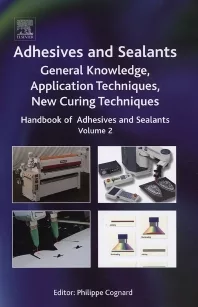Legends Of The Industry: Dr. Robert Krieble
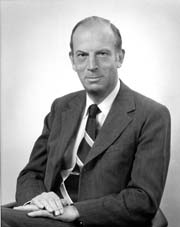
When I joined Loctite Corp. in the 1970s, the company was already a success story, and its co-founder, Dr. Robert Krieble, was already a living legend. Bob Krieble was a scientist and entrepreneur who built a great American corporation.
In contrast to some modern-day entrepreneurial success stories that are often glorified as being built by college dropouts, Loctite was built by a distinguished chemist. Bob obtained a Ph.D. in chemistry from Johns Hopkins University and became a very successful manager of the Chemical Development department at The General Electric Co.
In the early 1950s, GE invented a material called Anaerobic Permafil, a methacrylate-based adhesive sealant that remained liquid as long as it was in contact with air, but cured rapidly to a solid when air was excluded. However, it was not very stable and tended to cure unexpectedly and prematurely. I remember Bob telling us that he delivered samples to customers using a portable air pump to keep them liquid in the trunk of his car! Fortunately, Bob's father, Vernon Krieble, who was a chemistry professor at Trinity College in Hartford, CT, discovered that these sealants could be made shelf-stable by packaging them in low-density polyethylene bottles, which allowed atmospheric oxygen to diffuse into the liquid. Half-filling the bottles left a lot of free air space. Bob also contributed by patenting various quinone stabilizers for these materials.

Anaerobic liquids were the world's first 100%-reactive single-component adhesives, and Loctite prospered using a tough but successful strategy of selling them to (often skeptical) engineers by using trained engineers as salesmen, selling at very high prices, and educating the engineers on both the performance of the products and the long-term cost savings compared to low-cost mechanical alternatives such as lock-washers, gaskets, and tapes. Bob often commented that not only did Loctite invent its products, but it also invented its markets.
Bob Krieble then orchestrated a masterstroke by licensing the world's second 100%-reactive single-component adhesives - cyanoacrylates - from Eastman Chemical. Ironically, just like the anaerobics, combining stability in the package with fast cure speed had hindered the commercialization of these "instant" adhesives. Loctite chemists solved these problems, and the adhesives, named "Superglue," fueled phenomenal sales growth for the company in both industrial and consumer markets.
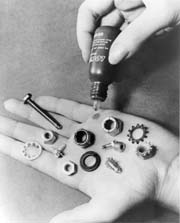
Loctite Corp. subsequently expanded into other technologies, including Dr. Krieble's original research interest, silicones, and became the leading specialty adhesives and sealants company in the world, with sales of around $800 million before being purchased by Henkel AG of Germany in 1997.
It didn't matter how busy Bob was in managing the corporation and being involved in its international expansion, high finance and marketing-he never let us forget that he was a scientist and that anaerobic adhesives were his "baby." He is, in fact, an inventor on several patents covering both anaerobics and silicones. Bob always enjoyed discussing the chemistry of anaerobics with young chemists and research managers like me, and we had some great discussions (friendly arguments may have been a better description in some cases). We didn't always agree with him, but Bob's views were often so provocative that they always drove us to find better chemistry to make our products faster, stronger and more versatile.
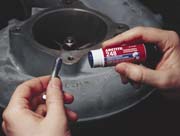
Nowadays, when we read almost daily of corporate executives being jailed for theft and fraud, the very wealthy Bob Krieble was a shining example of corporate frugality. Although very generous to his employees, Bob drove a small American car, would fly tourist class with us to Europe and stay in moderately priced hotels. An extreme example of his code of ethics occurred the day he was in my office and needed to use a phone to check on his wife who was ill. I did, of course, offer my phone to him, but he insisted on going into the factory to use a pay phone, saying that he could not make a personal call on a company phone!
A staunch proponent of capitalism and free enterprise, Bob founded The Krieble Institute after his retirement to promote democracy and economic freedom in the Soviet Union and Eastern Europe, and he visited that region many times. A couple of years after the fall of communism in Russia, Bob was attacked by some communist deputies in Russia and was portrayed in the communist press as an evil capitalist who brought down communism. Bob's response was to fly to Moscow and hold a press conference to respond to his critics. He began by explaining that as much as he was honored by their accusations, he felt that he could only take a little credit for the end of communism.2
Bob passed away in 1997 at age 80, and I know I speak for many former colleagues at Loctite when I say that Bob was a hero and an inspiration to us all.
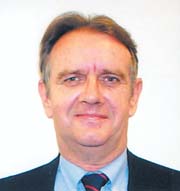
1. See "SuperGlue - Superman," ASI, July/August 2004.
2. Extract from Congressional Record, May 13, 1997.
Looking for a reprint of this article?
From high-res PDFs to custom plaques, order your copy today!



